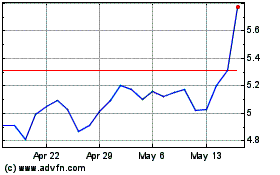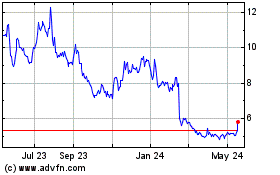Aurinia Pharmaceuticals Inc. (NASDAQ: AUPH) (Aurinia or the
Company), announced today the acceptance of six abstracts,
including five poster presentations, at the American Society of
Nephrology (ASN) Kidney Week 2024 taking place in San Diego, CA
October 23-27. These data reinforce the clinical importance of
LUPKYNIS® (voclosporin), a second generation calcineurin inhibitor
(CNI), for the treatment of adults with active lupus nephritis
(LN).
“The data featured at ASN elucidate the critical role LUPKYNIS
plays in advancing the treatment of lupus nephritis, especially in
populations disproportionately impacted by the disease. We’re
particularly excited about moving our ENLIGHT-LN™ registry forward,
as clinicians need insights into real-world treatment patterns.
Additionally, we continue adding to our growing body of evidence
that the unique mechanism of action of LUPKYNIS affects podocytes,
resulting in significant impact on kidney health in adults with
active LN,” said Dr. Greg Keenan, Chief Medical Officer of
Aurinia.
New real-world baseline data from ENLIGHT-LN, a U.S.-based
prospective, observational registry of adult patients with LN
treated with LUPKYNIS
This initial analysis of baseline data from 123 patients with
biopsy-confirmed LN who are initiating or have initiated treatment
with LUPKYNIS within the last 12 months provides a critical
foundation for understanding the real-world effectiveness and usage
patterns of LUPKYNIS. The subset of patients includes high
percentages of Black and Hispanic and/or Latino patients,
reflecting the larger population of LN in the US and the
communities disproportionately affected by lupus and LN.
Two new studies uncover the potential effects of LUPKYNIS on
podocytes in LN and idiopathic nephrotic syndrome compared to older
treatments
A new study explored the impact of cyclosporine A (CsA),
tacrolimus (TAC), and LUPKYNIS on podocyte cell biology and
biomechanics. Using an integrative approach that combined classical
cell biological assay with transcriptomics, quantitative
proteomics, and other analyses, the study found that all three
therapies modulate podocyte cytoskeletal architecture, but LUPKYNIS
enhanced podocyte cytoskeletal stability at lower concentrations
than CsA and TAC.
Another study investigated the effects of LUPKYNIS in a
preclinical model of idiopathic nephrotic syndrome. Results showed
that LUPKYNIS significantly improved proteinuria, reduced
hypercoagulability, enhanced lipid profiles, and showed
significantly better cell viability and cytoskeletal integrity, in
comparison to CsA.
Together, these findings highlight the important role that
LUPKYNIS plays in preserving kidney function and provide further
evidence differentiating LUPKYNIS from first-generation calcineurin
inhibitors.
Following is the complete guide to Aurinia’s accepted
abstracts at ASN 2024:
Title: Enlight-LN Registry:
Baseline Demographics and Clinical Characteristics of an Initial
Cohort of Patients Treated with Voclosporin for Lupus Nephritis in
the United States Authors: Niloofar Nobakht, Laura B.
Geraldino-Pardilla, Leanna M. Wise, Mohammad Kamgar, Lily Cipolla,
Lucy S. Hodge, Keelin Dahl Date: Thursday, October 24, 2024
Time: 10:00 a.m. – 12:00 p.m. PT Poster Number:
TH-PO653
Title: Disease Targeting Properties
of Voclosporin in Renal Transplant and Lupus Nephritis
Patients Authors: Simon Zhou, Linda M. Rehaume, Ernie
Yap, Henry Leher, Lucy Hodge, Robert B. Huizinga Date:
Thursday, October 24, 2024 Time: 10:00 a.m. – 12:00 p.m. PT
Poster Number: TH-PO642
Title: Immunologic Changes Over
Time in Repeat Kidney Biopsies from the AURORA Studies of
Voclosporin in Lupus Nephritis Authors: Samir V.
Parikh, Maddalena Bolognesi, Ivana Grbesa, Brad H. Rovin, Giorgio
Cattoretti, Vincenzo L'Imperio, Arnon Arazi, Lucy S. Hodge, Ernie
Yap Date: Friday, October 25, 2024 Time: 10:00 a.m. –
12:00 p.m. PT Poster Number: FR-PO839
Title: Integrative Systems Analyses
Reveal Calcineurin Inhibitor-Mediated Control of Human Podocyte
Biophysics and Physiology Authors: Jacob M. Wright,
Anthony Mendoza, Jonathan C. Haydak, Jenny Wong, Linda M. Rehaume,
Kirk N. Campbell, Evren U. Azeloglu, Maria Paola Santini
Date: Saturday, October 26, 2024 Time: 10:00 a.m. –
12:00 p.m. PT Poster Number: SD-PO549
Title: Voclosporin Ameliorates
Proteinuria and Directly Protects Podocytes in a Model of
Non-Inflammatory Glomerular Disease Authors: Yu
Kamigaki, Julie A. Dougherty, Amanda P. Waller, Katelyn J.
Wolfgang, Linda M. Rehaume, Jennifer L. Cross, Laura E. Biederman,
Zackary S. Stevenson, Eman Abdelghani, Bryce A. Kerlin, William E.
Smoyer Date: Saturday, October 26, 2024 Time: 10:00
a.m. – 12:00 p.m. PT Poster Number: SA-PO709
Title: Characterization of
Screening Patterns and Identification of Patients with Lupus
Nephritis in a Community Rheumatology Setting
Authors: Nehad Soloman, Jawad Bilal, Romy Cabacungan, Scott
Milligan, Andrew Sharobeem, John Tesser, Henry Leher
About Lupus Nephritis Lupus nephritis (LN) is a serious
manifestation of systemic lupus erythematosus (SLE), a chronic and
complex autoimmune disease. LN affects approximately 120,000 people
in the U.S. and disproportionately affects women and people of
color. People living with LN have high unmet needs and often face
significant barriers to optimal care. If poorly controlled, LN can
lead to permanent and irreversible tissue damage within the
kidney.
Medical guidelines recommend that all SLE patients receive
routine LN screenings at every visit. Guidelines also note that
delaying LN diagnosis has profound prognostic repercussions. Yet,
research shows that approximately 50% of SLE patients are not
screened for LN and 77% of people with LN go untreated. Aurinia is
committed to improving health outcomes for people living with LN by
educating patients and providers on the critical need for routine
screening and transformative therapies that can help improve health
outcomes.
About LUPKYNIS LUPKYNIS is a second generation
calcineurin inhibitor (CNI) with a dual mechanism of action, acting
as an immunosuppressant through inhibition of T-cell activation and
cytokine production and promoting podocyte stability in the kidney.
The AURORA Clinical Program, comprised of the AURORA 1 pivotal
trial and AURORA 2 extension trial, demonstrated the importance of
LUPKYNIS plus standard of care to preserve kidney health in
patients with active LN without reliance on chronic high-dose
glucocorticoids. It is the only clinical program to include three
years of LN treatment and follow-up with mycophenolate mofetil
(MMF) and steroids.
About Aurinia Aurinia Pharmaceuticals is a fully
integrated biopharmaceutical company focused on delivering
therapies to people living with autoimmune diseases with high unmet
medical needs. In January 2021, the Company introduced LUPKYNIS®
(voclosporin), the first FDA-approved oral therapy dedicated to the
treatment of adult patients with active lupus nephritis. Aurinia is
also developing AUR200, a differentiated, potential best-in-class
therapy for autoimmune diseases that targets both BAFF (B-cell
Activating Factor) and APRIL (A Proliferation-Inducing Ligand).
INDICATION AND IMPORTANT SAFETY INFORMATION
INDICATION
LUPKYNIS is indicated in combination with a background
immunosuppressive therapy regimen for the treatment of adult
patients with active lupus nephritis (LN).
Limitations of Use: Safety and efficacy of LUPKYNIS have not
been established in combination with cyclophosphamide. Use of
LUPKYNIS is not recommended in this situation.
IMPORTANT SAFETY INFORMATION
BOXED WARNINGS: MALIGNANCIES AND SERIOUS INFECTIONS
Increased risk for developing malignancies and serious
infections with LUPKYNIS or other immunosuppressants that may lead
to hospitalization or death.
CONTRAINDICATIONS: LUPKYNIS is contraindicated in
patients taking strong CYP3A4 inhibitors because of the increased
risk of acute and/or chronic nephrotoxicity, and in patients who
have had a serious/severe hypersensitivity reaction to LUPKYNIS or
its excipients.
WARNINGS AND PRECAUTIONS
Lymphoma and Other Malignancies: Immunosuppressants,
including LUPKYNIS, increase the risk of developing lymphomas and
other malignancies, particularly of the skin. The risk appears to
be related to increasing doses and duration of immunosuppression
rather than to the use of any specific agent.
Serious Infections: Immunosuppressants, including
LUPKYNIS, increase the risk of developing bacterial, viral, fungal,
and protozoal infections, including opportunistic infections which
lead to serious, including fatal outcomes.
Nephrotoxicity: LUPKYNIS, like other calcineurin
inhibitors (CNIs), may cause acute and/or chronic nephrotoxicity.
The risk is increased when CNIs are concomitantly administered with
drugs associated with nephrotoxicity. Monitor eGFR regularly.
Hypertension: Hypertension is a common adverse reaction
of LUPKYNIS therapy and may require antihypertensive therapy.
Monitor blood pressure regularly.
Neurotoxicity: LUPKYNIS, like other CNIs, may cause a
spectrum of neurotoxicities: severe include posterior reversible
encephalopathy syndrome (PRES), delirium, seizure, and coma; others
include tremor, paresthesia, headache, and changes in mental status
and/or motor and sensory functions. Monitor for neurologic
symptoms.
Hyperkalemia: Hyperkalemia, which may be serious and
require treatment, has been reported with CNIs, including LUPKYNIS.
Concomitant use of agents associated with hyperkalemia may increase
the risk for hyperkalemia. Monitor serum potassium levels
periodically.
QTc Prolongation: LUPKYNIS prolongs the QTc interval in a
dose-dependent manner when dosed higher than the recommended lupus
nephritis therapeutic dose. The use of LUPKYNIS in combination with
other drugs that are known to prolong QTc may result in clinically
significant QT prolongation.
Immunizations: Avoid the use of live attenuated vaccines
during treatment with LUPKYNIS. Inactivated vaccines noted to be
safe for administration may not be sufficiently immunogenic during
treatment with LUPKYNIS.
Pure Red Cell Aplasia: Cases of pure red cell aplasia
(PRCA) have been reported in patients treated with another CNI
immunosuppressant. If PRCA is diagnosed, consider discontinuation
of LUPKYNIS.
Drug-Drug Interactions: Avoid co-administration of
LUPKYNIS and strong CYP3A4 inhibitors or with strong or moderate
CYP3A4 inducers. Co-administration of LUPKYNIS with strong CYP3A4
inhibitors is contraindicated. Reduce LUPKYNIS dosage when
co-administered with moderate CYP3A4 inhibitors. Avoid use of
LUPKYNIS with strong or moderate CYP3A4 inducers.
ADVERSE REACTIONS
The most common adverse reactions (≥3%) were glomerular
filtration rate decreased, hypertension, diarrhea, headache,
anemia, cough, urinary tract infection, abdominal pain upper,
dyspepsia, alopecia, renal impairment, abdominal pain, mouth
ulceration, fatigue, tremor, acute kidney injury, and decreased
appetite.
SPECIFIC POPULATIONS
Pregnancy: Avoid use of LUPKYNIS.
Lactation: Consider the mother’s clinical need for
LUPKYNIS and any potential adverse effects to the breastfed infant
when prescribing LUPKYNIS to a lactating woman.
Renal Impairment: LUPKYNIS is not recommended in patients
with baseline eGFR ≤45 mL/min/1.73 m2 unless benefit exceeds risk.
If used in this population, reduce LUPKYNIS dose.
Hepatic Impairment: For mild or moderate hepatic
impairment, reduce LUPKYNIS dose. Avoid use with severe hepatic
impairment.
Please see Prescribing Information, including Boxed Warning, and
Medication Guide for LUPKYNIS.
View source
version on businesswire.com: https://www.businesswire.com/news/home/20241011330254/en/
Media & Investor Inquiries: Andrea Christopher
Corporate Communications & Investor Relations Aurinia
Pharmaceuticals Inc. achristopher@auriniapharma.com
General Investor Inquiries: ir@auriniapharma.com
Aurinia Pharmaceuticals (NASDAQ:AUPH)
Historical Stock Chart
From Nov 2024 to Dec 2024

Aurinia Pharmaceuticals (NASDAQ:AUPH)
Historical Stock Chart
From Dec 2023 to Dec 2024
